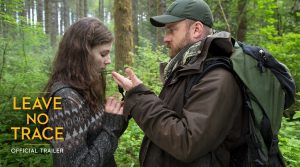Leave No Trace opens with a traumatized veteran, Will (Ben Foster), and his young teenage daughter, Tom (Thomasin Harcourt McKenzie), living off the grid for years in the largest urban park in America, aptly named Forest Park, located in Portland, Oregon.
It becomes evident that Will’s Post-Traumatic Stress Disorder (PTSD) is the culprit that both characters must manage as he is obsessed with staying on the move, never setting up camp in one place for too long. It is fascinating to watch this duo navigate homelessness in a peaceful and accepting manner, albeit Will’s persistence to keep his young teenage daughter by his side in his anxious battle with isolation is challenging for the viewer to sympathize with. He rejects what is seemingly best for Tom after being essentially rescued and provided for by social services by escaping back into the wilderness to brave elements that are increasingly harsh the further north they travel.
This quiet story with meager dialogue becomes more unsettling as Tom, who is emotionally vulnerable throughout, wants to stay in one place and build a life. Her inner struggle is apparent, for she is devoted to her father, even as she calls attention that “his struggle is not hers.” The choices made in the end serve to honor the individual with compassion, understanding, and acceptance.
The Dove Take
This film grapples with poignant relationship dynamics surrounding issues of parenting, homelessness, discrimination, and mental illness, but it does so in a genuine and sensitive manner. Leave No Trace is awarded the Dove-Approved Seal for 12+.





